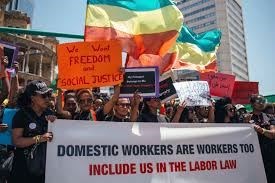Qatar abolishes Kafala system, possible push for Lebanon towards similar reforms
BEIRUT: While Qatar effectively dismantles a resented employment condition, the Kafala employment system, local activists wonder when will Lebanon adopt this move.
The International Labor Organization said as of now, migrant workers in Qatar can change jobs before the end of their contracts without obtaining the permission of their current employers.
Kafala ties workers to a “sponsorship” by their employer and this sponsorship have a special regulation, meaning they cannot move jobs or leave the country without the employer’s approval.
Human rights groups have campaigned for years to have kafala abolished across the Gulf, whose countries use millions of low-paid immigrant workers mostly from the Indian subcontinent.
Amnesty International praised the move as “an encouraging sign that Qatar may finally be heading in the right direction,” although employers still can file criminal charges against “absconding” employees, meaning those who left their jobs without permission.
“Lebanon is one of only two countries in the Middle East that employs large numbers of migrant domestic workers but has no law regulating their work in the country,” Aya Majzoub, Lebanon researcher at Human Rights Watch told Annahar.
According to Majzoub, the current contract lacks vital safeguards against forced labor and does not meet international human rights and labor standards. “For example, it does not give migrant domestic workers the right to the minimum wage nor does it allow them to leave the employer’s home without permission. It also does not allow workers to terminate their contact except in extreme cases of abuse, with the burden of proof falling on the worker,” Majzoub told Annahar.
Human Rights Watch reported that an estimated 250,000 migrant domestic workers, the majority of them women from African and Southeast Asian countries, work in Lebanon. They are excluded from Lebanon’s Labor Law protections, including requirements for a minimum wage, limits on working hours, a weekly rest day, overtime pay, and freedom of association.
Back in April 2019, the Minister of Labour invited Amnesty International to be part of a Working Group tasked with submitting a reform plan aimed at dismantling the kafala system. The group was coordinated by the International Labour Organization. In June 2019, the Working Group submitted to the Ministry of Labour a plan of action that sets out the necessary reforms to dismantle the kafala system over the short and medium-term. However, the then-Minister of Labour resigned soon after the onset of Lebanon’s protest movement before adopting any of the suggested reforms, and nothing happened after that.
The economic crisis, compounded by the Covid-19 pandemic, has made a life for migrant domestic workers even worse. Many have reported that incidents of abuse increased during the lockdown while others have said that their employers slashed their salaries – if they paid them at all.
Employers have abandoned hundreds of workers over the last few months, outside their consulates or embassies, often without money, passports, or their belongings, and without return tickets for workers who are unable to afford expensive repatriation flights to their home countries.


 اشترِك في نشرتنا الإخبارية
اشترِك في نشرتنا الإخبارية












